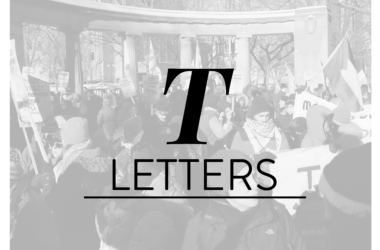Morality and politics are inextricably tied. In Plato’s Republic, the political arrangement of the city-state serves to elucidate justice and the Good, positioning politics as ontologically prior to morality—a relationship that also seems to hold in Marxist thought. In utilitarian thought—and much of contemporary conceptions of politics— morality comes first and tells us what is politically legitimate.
However we conceive of the relationship between morality and politics, there is something ridiculous to drawing a stark distinction between the two as Erica Stefano sought to do in “The elephant in the room.” The article, in which she decries the judgement conservative students face in the university, draws a narrative link between the growing view that politics are “synonymous with morality and values” and hostility toward conservatives.
“The theoretical gap between moral values and stances on government policies is often neglected. Believing in something universal, such as wanting to help others, means different things for different people in the realm of politics,” the article reads.
It is difficult to disagree that there is a conceptual difference between morality and politics, of course. Utilitarians and Kantian deontologists agree that murder should be outlawed despite operating under wildly different moral frameworks. And two utilitarians who don’t have the same knowledge of the facts may support different political positions for that reason.
But the existence of a conceptual difference doesn’t mean that one idea does not significantly shape the other. Being against same-sex marriage is a political stance, but it tells us a whole lot about people’s morality. Being in favour of administrative detention—detention without trial or due process, often of indefinite length—also says a whole lot about people. It tells me that they, as Stefano’s article puts it, “ultimately want the best for themselves and those they love”—but apparently for no one else.
Because we hash out our collective treatment of others in the political arena, it is an arena where justice either obtains or fails because of the very policies we propose. Advocating for policies which treat others as “less than” not because of and proportionate to any moral fault, but because of who they are is plainly unjust. Injustice is a mark of immorality.
If we must withhold judgement of others for their political position, then we cannot judge those whose immorality operates at arm’s length through the apparatus of the state. Although we can all agree that murder is evil, it is not murderers who cause the most harm in this world, but political actors. Political actors, not isolated individuals, legitimated genocide and, just south of the Canadian border, concentration camps for migrant children.
This, perhaps, is the elephant in the room. Politically abhorrent positions knowingly held are constitutive of immorality. If you are finding yourself rejected by others because of the positions you adopt, perhaps the problem isn’t intolerance to differing opinions. Perhaps it is instead that your politics are an indelible stain on your moral character.






